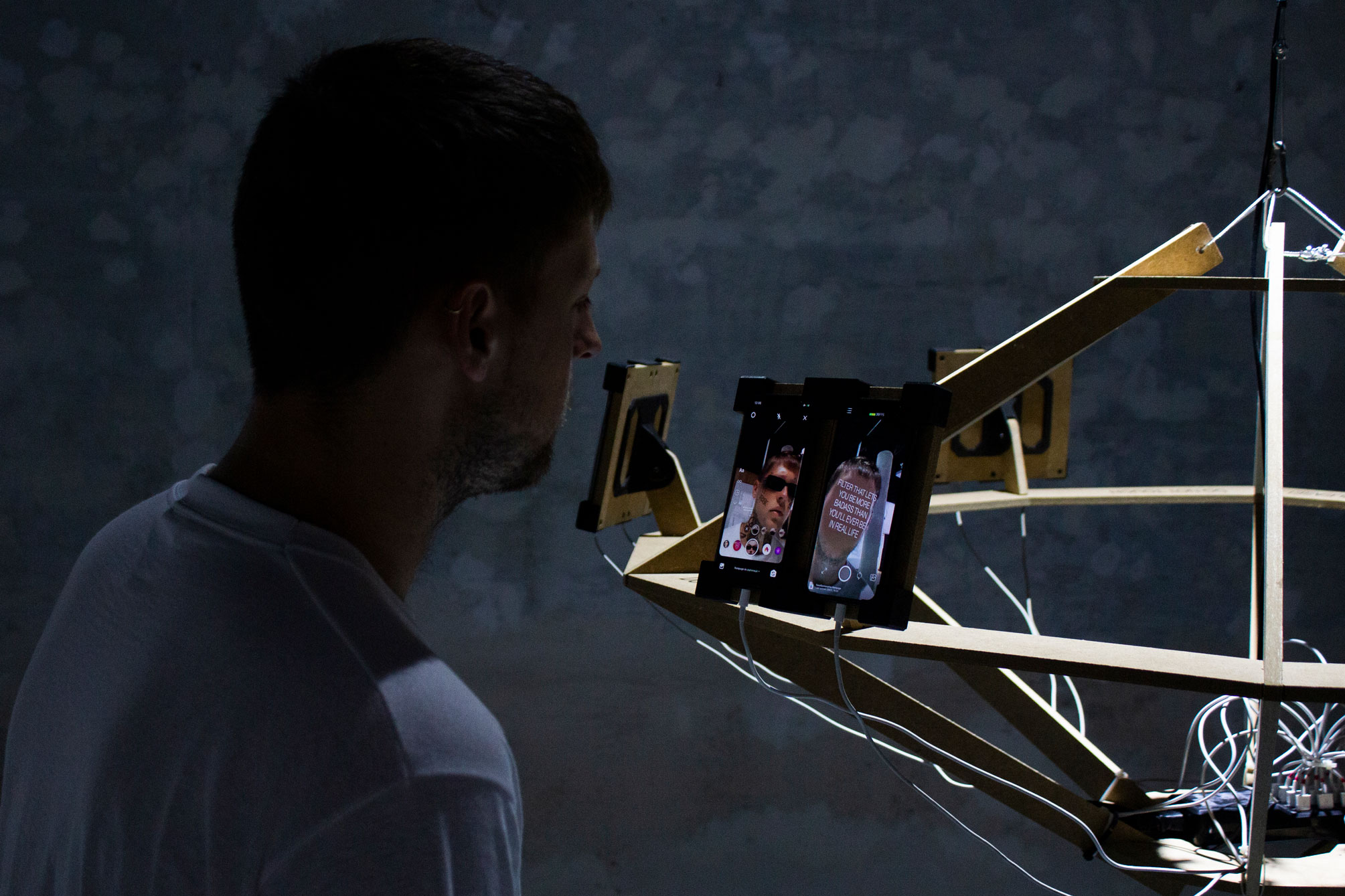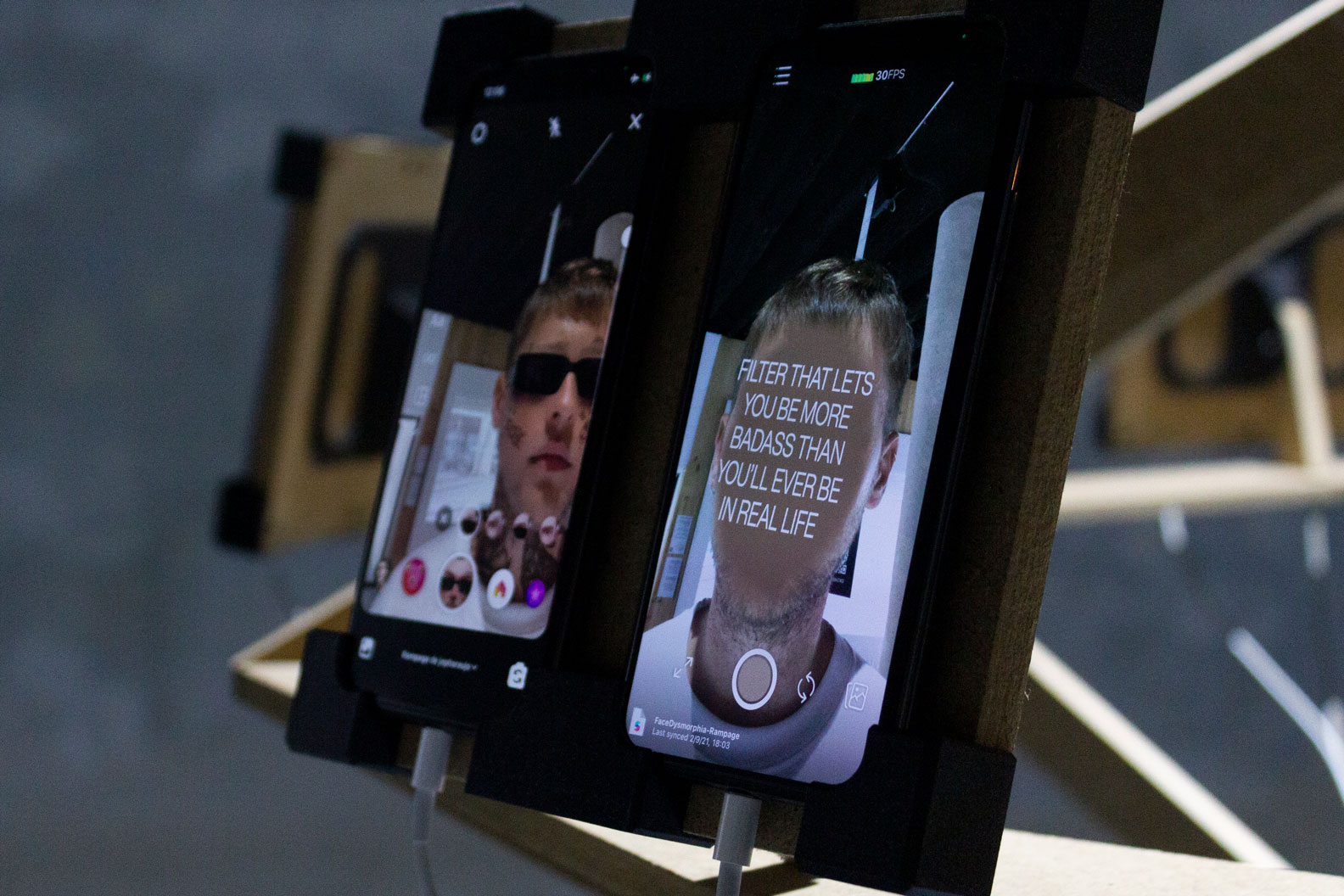Selfie dysmorphia
A form of violence that stems from self-exploitation, in which the human being exercises its freedom to change the public perception of their bodies to be more desirable. This type of violence is exercised from within and is rooted in the growth of appearance dissatisfaction in an age of Selfie Culture and Social Media.

The piece
Selfie Dysmorphia is a term that describes a type of body image disorder that reflects a need to heavily edit one’s own digital image, coupled with an intense unhappiness with one’s own actual appearance after using digital filters. This might feel Black Mirror-y but it is true. Studies say that 60% of american girls feel upset when their real appearance doesn’t match the online version of themselves.
Constantly disliking the way we look and thinking that it is an individual, isolated problem is a perfect example of symbolic violence. We all have been culturally brought up to feel that “we’re never good enough”. And in the end, don’t we all blur our backgrounds on Zoom when the house looks messy? Haven’t we all perfected our dark circles after a rough night?
Filters hide what we all want to hide and let us become the best, more desirable, socially acceptable version of ourselves. The problem starts when we forget who we are behind the mask.
Ryan-Mosely Tate (2021) “Beauty Filters Are changing the way Young girls see themselves”. MIT Technology Review (online) Haines, Anna (2021) “From ‘Instagram Face’ To ‘Snapchat Dysmorphia’: How Beauty Filters Are Changing The Way We See Ourselves”. Forbes (online)


Context
In 2018 a UK-based cosmetic doctor started noticing that where patients had once brought in pictures of celebrities with their ideal nose or jaw, they were now pointing to photos of “themselves”.
These selfies were typically edited with Snapchat or the airbrushing app Facetune and showed what is called the “Instagram look”: big eyes, pouty lips, small nose.
A recent report in the US medical journal JAMA suggested that filtered images’ “blurring the line of reality and fantasy” could be triggering body dysmorphic disorder (BDD), a mental health condition where people become fixated on imagined defects in their appearance.
Researchers don’t yet understand the impact that sustained use of filters may have, but they do know there are real risks—and it seems that young girls are the ones taking it. By age 13, 80% of american girls distort the way they look online.
Some initiatives are exploring different ways to raise awareness on the subject: Norway, for instance, has recently passed a law that demands influencers to state whether a picture has been altered or not. And it seems that we’re about to see more regulations tackling the issue in the next few years.
Related concepts
Great Inversion: Guy Debord’s “Society of the Spectacle” talks about the change in the perception of images throughout history. From Plato and his critiques on images as liars (never presenting the reality and becoming simple copies misleading to the idea of truth), to the current obsession with the concept of “image”.
“The march of society, of human beings, is turned into the collective play of mere images that entails images of reality becoming more important than reality itself.”
Symbolic Violence: Concept coined by Pierre Bourdieu. A process of cultural learning which occurs through habits and dispositions that appear in an "unconscious" way, naturalising a "voluntary submission". This is justified by the subject in the belief that this is the only way or path, in a framework of relationships characterized by fears, insecurities and the aforementioned "dependency" for decision making.
Chiu, Allyson (2021). “Patients are desperate to resemble their doctored selfies. Plastic surgeons alarmed by ‘Snapchat dysmorphia.’”. The Washington Post. (online) Rajanala, Susruthi et al. (2018) "Selfies—living in the era of filtered photographs." JAMA facial plastic surgery Dove (2019) “The Self-Esteem Project”. Dove (online) Débord, Guy (1967) “The society of the spectacle” Zone Bourdieu, Pierre. (2003). “Symbolic violence. In Beyond French Feminisms” Palgrave Macmillan
